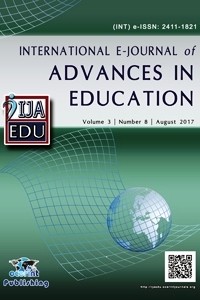
International E-Journal of Advances in Education
Yazarlar: ["Vania IVANOVA"]
Konular:-
DOI:10.18768/ijaedu.1067999
Anahtar Kelimeler:Green investments,Sustainable development,Environmental transformation,Higher economic education,Education reform
Özet: At the 2012 UN Conference on Sustainable Development, which became known as Rio+20, one of the main focuses was on the opportunities of the green economy as a way out of the global crisis. It is an alternative for future development and overcoming the crisis turmoil in most countries of the world. Tackling climate and environmental challenges is the defining task of the current generation. If the moment of post-crisis economic restructuring is not used to choose a model of sustainable development with an emphasis on the green economy, low-carbon production and environmentally friendly industry, we are condemning ourselves to an unsustainable future, with high costs due to dynamic fuel prices and serious climate change. To meet these challenges requires profound, structural transformations, both in the technologies used to date and, to a very large extent, the use of new technologies relevant to the needs of the 21st century, innovation and the creation of new products and services that guarantee the possibility of sustainable development. All of this requires the mobilisation of huge financial resources, on the one hand, but also places serious demands on the workforce and the labor market. New clean and green technologies, new business management models also imply a new quality of knowledge. The aim of this paper is to analyze to what extent the current structure of the curricula in universities preparing business professionals corresponds to the new needs. The experiences of 6 universities in France and Bulgaria are analyzed. A comparative analysis of the offered Master's programmes and an assessment of their degree of relevance to the future requirements of the managerial elite is made. The conclusions show different degrees of preparedness of the universities, a certain underestimation of the importance of such training and the need for more adaptability of knowledge to the new realities. The added value of this study is in the recommendations for change in economic education, in the context of the need and prospects for ecological transformation.